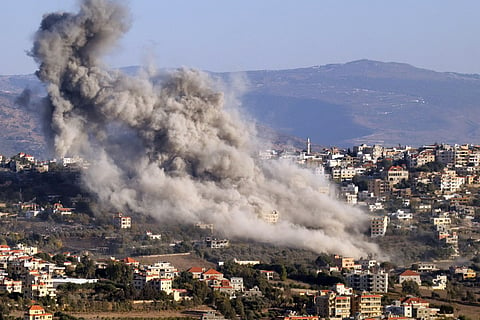

BEIRUT: Lebanon's health ministry said an Israeli strike killed three people near the southern city of Sidon on Sunday as more bombs fell in the country's east after Israel warned it would again hit Hezbollah targets there.
In Israel, the military said it intercepted several projectiles fired from Lebanon into Israeli territory, while some fell in unpopulated areas.
Israel and Iran-backed Hezbollah have been at war since September 23, when Israel escalated air raids over the border after a year of tit-for-tat exchanges of fire. One week later it sent ground troops into southern Lebanon on "targeted raids".
Hezbollah said it was acting in support of Palestinian militants Hamas, whose unprecedented attack against Israel on October 7 last year triggered the ongoing war in Gaza.
"The Israeli enemy's raid on Haret Saida resulted in an initial death toll of three people killed and nine others injured," Lebanon's health ministry said, referring to a densely populated area near Sidon.
Lebanon's official National News Agency (NNA) reported another Israeli strike south of Sidon, on the town of Ghaziyeh. That strike hit a residential building, according to an AFP correspondent, who said a child was rescued from the rubble.
NNA said other Israeli strikes hit near a hospital in Tebnin, a town in the south Lebanon district of Bint Jbeil. The mayor of Tebnin told AFP the hospital was significantly damaged.
Neither the Haret Saida strike nor those in Lebanon's south were preceded by an Israeli evacuation warning.
Heavy air raids
Israel's military did issue a warning for Lebanon's Baalbek area, which includes east Lebanon's main city and UNESCO-designated Roman ruins, saying it would be targeting Hezbollah-linked facilities.
An AFP correspondent later reported at least three strikes in the Baalbek area, where Hezbollah holds sway and which has seen heavy air raids in the past few days.
The war has killed more than 1,900 people in Lebanon, according to an AFP tally of Lebanese health ministry figures.
Among the latest casualties was a Bangladeshi killed Saturday in a strike on his way to work in Beirut, Bangladesh's ambassador to Lebanon said in a statement.
Israel's military says 38 soldiers have been killed in the Lebanon campaign since it began ground operations.
Iran-aligned groups in Yemen, Iraq and Syria have also been drawn into fighting, and Iran and Israel have themselves attacked each other, heightening fears of even wider conflict.
Iran's supreme leader Ayatollah Ali Khamenei on Saturday warned Israel and the United States they "will definitely receive a tooth-breaking response" for attacks on Iran and its allies.
Israel has warned Iran against responding to its October 26 attack.
On Sunday demonstrators burned Israeli and US flags outside the former American embassy in Tehran to mark the anniversary of the 1979 hostage crisis that has shaped relations between Washington and Tehran ever since.
American B-52 bombers have arrived in the Middle East, the US military said on Saturday, as part of reinforcements being sent to the region in a warning to Iran.
In Gaza the Israeli military again reported "dozens" of militants killed in the Jabalia area of north Gaza where, since October 6, Israeli forces have carried out a major air and ground assault to stop Hamas from regrouping.
Sacks of flour
On Friday the heads of United Nations agencies described the area as "under siege" and "denied basic aid and life-saving supplies".
In central Gaza on Sunday, people crowded to receive sacks of flour from a distribution point of the United Nations agency for Palestinian refugees (UNRWA) in Deir el-Balah.
Israel's parliament last Monday banned UNRWA -- the main aid agency in Gaza -- from operation in Israel and occupied east Jerusalem, despite objections from the international community.
If implemented, the ban would be a blow to humanitarian work in Gaza, according to experts.
The ban came after the United States on October 15 warned Israel it could withhold some of its billions of dollars in military assistance unless it improves aid delivery to Gaza within 30 days.
Also in Deir el-Balah on Sunday, relatives at Al-Aqsa Martyrs Hospital mourned over the bodies of a father and son killed during Israeli bombardment.
Hamas's October 7 attack on Israel resulted in 1,206 deaths, mostly civilians, according to an AFP tally of Israeli official figures.
Israel's military response against Hamas has killed 43,314 people in Gaza, a majority of them civilians, according to figures from the Hamas-run territory's health ministry which the United Nations consider to be reliable.
During their attack, Palestinian militants seized 251 hostages, of whom 97 are still in Gaza. The Israeli military says 34 of them are dead.
At a protest Saturday night in Tel Aviv, hundreds voiced their frustration with Israel's government for failing to secure an agreement that would bring the remaining hostages home.
Ifat Kalderon, an anti-government protester afraid for her cousin still held in Gaza, said Prime Minister Benjamin Netanyahu "sabotages" every attempt at a deal.
"He always blamed Sinwar, but now there is no Sinwar," she said, referring to Hamas leader Yahya Sinwar who Israel killed last month. "Every time he finds another reason," the 50-year-old stylist told AFP.